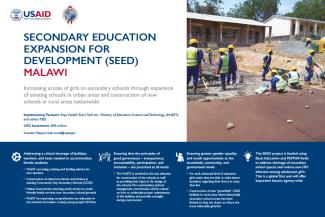Increasing access of girls to secondary schools through expansion of existing schools in urban areas and construction of new schools in rural areas nationwide
Implementing Partners: Feps GmbH, Tetra Tech Inc., Ministry of Education Science and Technology (MoEST), and others TBD
USG Investment: $90 million
Contact: Mayeso Undi
Addressing a critical shortage of facilities, teachers, and seats needed to accommodate female students
- MoEST recruiting, training, and funding salaries for new teachers
- Construction of classroom blocks and latrines in existing Community Day Secondary Schools (CDSS)
- Malawi Government ensuring youth access to youth-friendly health services near secondary school grounds
- MoEST incorporating comprehensive sex education in the national curriculum to keep young people HIV-free
Ensuring that the principles of good governance—transparency, accountability, participation, and inclusion—are practiced at all levels:
- The MoEST is involved in the site selection for construction of the schools as well as providing their input in the design of the schools. The communities (school management committees) will be trained on how to undertake proper maintenance of the facilities and provide oversight during construction
Ensuring greater gender equality and youth opportunities at the household, community, and government levels:
- For each advanced level of education girls attain, they are able to make better decisions regarding their future in areas they live
- Construction of new “greenfield” CDSS facilities in rural areas where historically secondary school access has been limited so they are closer to where the most vulnerable girls live
The SEED project is funded using Basic Education and PEPFAR funds to address shortage of secondary school spaces and reduce new HIV infection among adolescent girls. This is a global first and will offer important lessons agency-wide.

